#Permanent Council of Ministers
Text
Tatar: "We have entered a new era in our relations with Azerbaijan"
TRNC President Ersin Tatar stated that his visit to Azerbaijan is very important and fruitful and thanked İlham Aliyev, President of the Republic of Azerbaijan, ministers, members of parliament and the press of Azerbaijan for their interest and attention.
After completing his visits to Azerbaijan, President Ersin Tatar returned to TRNC yesterday evening 16th October 2023 and held a press…

View On WordPress
#40th Term Meeting#AZERBAIJAN#International Organisation of Turkic Culture (TURKSOY)#Minister Fikri Ataoğlu#Permanent Council of Ministers#statement#TRNC President Ersin Tatar
0 notes
Text
A week ago, US President Joe Biden claimed that a “ceasefire” deal in Gaza was imminent and could take effect as soon as March 4. “My national security adviser tells me we are close,” he told reporters while eating ice cream in New York City.
But ice cream or not, Biden’s actual position was not nearly that sweet. A subsequent statement by a senior Biden administration official claimed Israel had “basically accepted” a proposal for a temporary pause in fighting. But as of March 4, Israeli Prime Minister Benjamin Netanyahu and his Mossad director were still refusing to send a delegation to Cairo, where talks with Hamas were under way.
The Biden administration’s eagerness to claim victory in its search for some kind of temporary truce indicates how much it is feeling the heat of the rising global and domestic pressure demanding an immediate ceasefire, an end to the Israeli genocide, an end to the threat of a new escalation against refugee-packed Rafah, and an end to the siege of Gaza and immediate unhindered provision of massive levels of humanitarian aid.
Despite Washington’s vain hopes for March 4 and the unofficial goal of a ceasefire by the beginning of the Muslim holy month of Ramadan on March 10, the deal remains elusive. Media reports indicate Biden is telling the Qatari and Egyptian leaders that he is putting pressure on Israel to agree to a truce and a captives swap.
But his claim of pressuring Israel is undermined by the continuing US vetoes of ceasefire resolutions at the United Nations Security Council, most recently on February 20, as well as the continuing flow of United States weapons and money to Israel to enable its assault.
And, on the alternative resolution the Biden admin has put forth after vetoing Algeria's resolution (which called for an "immediate humanitarian ceasefire," "forced displacement of the Palestinian civilian population," and "unhindered humanitarian access to Gaza."):
[...] Linda Thomas-Greenfield, Biden’s ambassador to the UN, cast the sole veto against the Algerian resolution, and instead put forward an alternative US text, claiming it also supported a ceasefire.
But the proposed US language does not call for an immediate or permanent ceasefire or an end to Israeli genocide; it does not prevent an attack on Rafah or end the Israeli siege. The proposed US resolution is not designed to end the murderous Israeli war against Gaza – nor is the deal that is currently being negotiated in Cairo.
To the contrary, the provisions of the US draft resolution reflect the true intentions of the Biden administration vis-a-vis its continuing support of Israel, and reveal the limitations of the truce it is trying to orchestrate.
While the US draft resolution does use the dreaded word “ceasefire” – which had been prohibited in the White House for months – it does not call for an immediate halt in the bombing, only “as soon as practicable”, with no indication of when that might be. It does not call for a permanent ceasefire either, leaving Israel free to resume its genocidal bombing – presumably with continuing US support.
Virtually everything the US draft calls for is undercut by what is left out. The demand for “lifting all barriers to the provision of humanitarian assistance at scale” in Gaza certainly sounds appropriately robust. But that’s only until you realise that the text’s failure to challenge or even name the principal barrier to aid getting in – Israel’s bombardment – means that this is not a serious plan to end Israel’s deadly siege.
It should not surprise anyone that “the Biden administration is not planning to punish Israel if it launches a military campaign in Rafah without ensuring civilian safety” – as Politico reported – despite claiming it wants a credible plan to ensure Palestinian safety. No one in the Biden administration has even hinted at imposing consequences for Israel’s constant rejection of the insipid appeals for restraint – such as conditioning aid on human rights standards (as required by US law) or cutting US military aid altogether. That’s what real pressure would look like.
A more accurate picture of Washington’s approach to Israel’s war against Gaza is the continuing US pipeline of weapons to make Israel’s murderous assault on Gaza more effective, more efficient, and more deadly.
According to the Wall Street Journal, the “Biden administration is preparing to send bombs and other weapons to Israel that would add to its military arsenal even as the US pushes for a ceasefire in Gaza.” The arms the US intends to hand over to the Israeli army include MK-82 bombs, KMU-572 Joint Direct Attack Munitions and FMU-139 bomb fuses, worth tens of millions of dollars. It is more than likely that the administration will do another end run around US Congress to send the weapons without relying on congressional approval, as it did on at least two occasions last December.
. . . full article on Al Jazeera (4 Mar 2024)
3K notes
·
View notes
Text
…
About 150 people carrying St George’s Cross flags, shouting “you’re not English any more” and “paedo Muslims off our street”, were greatly outnumbered in Leeds by hundreds of counter-protesters shouting “Nazi scum off our streets”. Skirmishes broke out between demonstrators and punks – in town for a festival – in Blackpool, with bottles and chairs thrown.
In Bristol, police kept protesters and counter protesters apart before a group headed to a hotel used to house asylum seekers.
The need for urgent political intervention was stressed by the government’s independent adviser on political violence and disruption, Lord Walney, who told the Observer that new emergency powers may be needed. “The system isn’t set up to deal with this rolling rabble-rousing being fuelled by far-right actors,” he said.
“I think home office ministers may want to look urgently at a new emergency framework – perhaps temporary in nature – that enables police to use the full powers of arrest to prevent people gathering where there is clear intent to fuel violent disorder.”
Keir Starmer held a meeting of senior ministers on Saturday in which he said police had been given full support to tackle extremists who were attempting “to sow hate by intimidating communities”. He made clear that the right to freedom of expression and the violent scenes over recent days were “two very different things”.
Last week’s riots followed the killing of three young girls at a Taylor Swift-themed dance class in Southport on Monday. Axel Rudakubana, 17, from Lancashire, is accused of the attack, but false claims were spread online that the suspect was an asylum seeker who had arrived in the UK by boat. In the wake of these messages, far-right protesters – guided by social media – gathered in cities across the country.
A key factor in this spread of online disinformation involved Elon Musk’s decision to allow rightwing activists such as Tommy Robinson back onto his social media platform X, said Joe Mulhall, director of research at Hope not Hate, the anti-fascism organisation. “The initial disinformation and anger was being perpetrated by individuals on Twitter, for example, that have been previously deplatformed,” he said. “And now they’ve been replatformed.”
Robinson was permanently banned from the platform (then called Twitter) in March 2018, then reinstated in November last year, after Musk bought it. “We hadn’t seen any significant numbers at any demonstrations since 2018,” Mulhall added.
An example of the danger posed by the misuse of social media was revealed in Stoke-on-Trent, where police were forced to deny there had been a stabbing, countering claims made on social media. “There is growing speculation that a stabbing has taken place as a result of the disorder today. We can confirm this information is false and no stabbings have been reported to police or emergency responders, despite videos fuelling speculation on social media,” police said.
The danger of such intervention was stressed by Ben-Julian “BJ” Harrington, the National Police Chiefs Council lead for public order, who condemned social media disinformation as a cause of last week’s disorder.
He said: “We had reports today that two people had been stabbed by Muslims in Stoke – it’s just not true. There’s people out there, not even in this country, circulating and stoking up hatred, division and concerns in communities that they don’t care about, don’t know and don’t understand.”
144 notes
·
View notes
Text
Palestinian Ministry of Foreign Affairs
The ministry said that adopting the resolution is a step in the right direction to end the five-month war, to allow the entry of aid, and to begin the return of those displaced.
Hamas official Basem Naim
The Palestinian group Hamas said it was committed to the conditions of the resolution and said Israel must be held accountable in adhering to it.
“It is the role of the international community to oblige Israel and to end this double standard,” Basem Naim, a senior official in Hamas’s political bureau, told Al Jazeera.
“The question is ‘How strong is the international community to oblige Israel to implement this resolution?'” he said.
The group also stressed the necessity of reaching a permanent ceasefire that leads to the withdrawal of all Israeli forces from the Gaza Strip, and affirmed its readiness to engage in an immediate exchange process that leads to the release of prisoners on both sides.
Israeli ambassador to the UN Gilad Erdan
Erdan said the resolution failed to demand a ceasefire without “conditioning” it on the release of captives in Gaza, saying it “undermines the efforts to secure their release”.
“It is harmful to these efforts because it gives Hamas terrorists hope to get a ceasefire without releasing the hostages. All members of the council … should have voted against this shameless resolution,” he said.
Israeli Prime Minister Benjamin Netanyahu
Shortly after the resolution passed, Netanyahu cancelled the visit of an Israeli delegation to Washington, DC, which the US had requested to discuss concerns over a proposed Israeli invasion of Rafah, a city in crowded southern Gaza.
The US abstention was “a clear retreat from the consistent position of the US”, and would hurt Israel’s war efforts and bid to release the hostages still held by Hamas, the prime minister’s office said.
US White House
The White House said in a statement that Washington’s abstention from the vote “does not represent a shift in our policy … but because the final text does not have the language that we think is essential, like a condemnation of Hamas, we could not support it”.
White House spokesperson John Kirby said that US officials were “very disappointed about Netanyahu’s decision not to send his advisers for talks at the White House about the Rafah operation”.

#yemen#jerusalem#tel aviv#current events#palestine#free palestine#gaza#free gaza#news on gaza#palestine news#news update#war news#war on gaza#ceasefire now#ceasefire deal#united nations#security council#politics
248 notes
·
View notes
Text
There are two main ways of comparing military budgets: as a percentage of GDP or as a percentage of the total national budget. Israel stood high on both: in 2022, Israel’s military budget amounted to 4.51 percent of its economy — the highest percentage among OECD countries. That same year, Israel's military budget stood at 12.2 percent of its total annual budget.
And that is not the whole story. Economist Yossi Zeira points out that the above GDP figure is partial, as it does not take into account the loss of GDP caused by the fact that a large number of young men are outside the civilian labour force, a fact that translates into a 5.7-percent loss of GDP per year.
Once the defence budget is determined, not much is left for other, non-military civilian budgets. In 2023, while the average civilian public expenditure in OECD countries stood at 42.2 percent of GDP (not including interest and military expenditure), in Israel it stood at 32.9 percent — a quarter less.
With all those resources, Israel finds it hard to finance the full costs of maintaining its “imperial” military status without foreign assistance. Today, foreign financial and non-financial military aid comes mainly from the US. In the past, it had more varied sources: in 1956, such aid came from France and Great Britain and from 1967 on, from the US.
According to the US Council on Foreign Relations, US aid accounts for some 15 percent of Israel’s defence budget. At the time of this writing, the US has signed a memorandum of understanding assuring Israel nearly 4 billion dollars per year through 2028. As for the actual fighting in the present war with Hamas, the US provided Israel with tank and artillery ammunition, bombs, rockets, and small arms, and was considering further supplies, including 50 F-15 fighter aircraft.
Enough to keep the fighting going.
[...]
From the very beginning of the present war, Israel’s prime minister and almost all IDF generals have frequently warned that the war will be long. The Bank of Israel seems to agree, as it recently published a figure of 250 billion shekels for the total cost of the present war with Hamas — if the war lasts until 2028. That means a permanent very large military budget, continuous large aid packages from the US, and growing pressures on the budgets for social services, demands for which increase as a result of the ongoing war and seemingly unending dislocations.
18 September 2024
46 notes
·
View notes
Text

Contact your government
Council to greenlight Chat Control – Take action now!
It is crucial we demonstrate that civil society is alert now. You can either contact your ministries of the interior and of justice, or you can contact your government’s ‘permanent representation’ to the EU. You can find the contact details for all permanent representations on the website „EU Whoiswho“.
Tell your government that the current draft on Chat Control (officially called “Regulation … to prevent and combat child sexual abuse”) is unacceptable. You can find a summary of the draft in this blogpost, and there is critical analysis by European Digital Rights and CDT. Be polite but also resolute and ask them to clearly voice their disagreement with the proposal and to vote against the proposal.
Further, ask them to insist on a formal vote and for the abstentions to be properly counted by the Presidency. (Otherwise, in the Permanent Representatives Committee, sometimes the procedural trick is used not to ask for abstentions and to ignore them).
Timeline
On Thursday, 13 June, ministers of the interior discussed the progress of discussions (find a recording here). The Belgian Council presidency announced that they will present a new compromise proposal afterwards. According to documents leaked by netzpolitik.org, the COREPER 2 meeting in which they will put it to a vote will already take place on Wednesday, 19 June.
So we all need to take action as soon as possible and demand a firm “No” by our governments against the Chat Control proposal to ward off this attempt to greenlight Chat Control in the Permanent Representatives Committee on 19 20 June. Time is pressing. This may be our last chance to stop Chat Control!
#urgent#chat control#fascism#internet#kosa#censorship#surveillance#privacy#eu#european union#activism#2024
41 notes
·
View notes
Text
Following are remarks Friday of the foreign minister of Poland, Radek Sikorski, at the United Nations Security Council.
* * *
I’m amazed at the tone and the content of the presentation by the Russian ambassador.
And I thought I could be useful by correcting the record. Ambassador Nebenzya has called Kyiv a client of the West. Actually, Kyiv is fighting to be independent of anybody.
He calls them a criminal Kyiv regime. In fact, Ukraine has a democratically elected government.
He calls them Nazis. Well, the president is Jewish, the defense minister is Muslim, and they have no political prisoners.
He said that Ukraine was wallowing in corruption. Well, Alexei Navalny documented how honest and full of probity his own country is.
He blamed the war on U.S. neo-colonialism. In fact, Russia was trying to exterminate Ukraine in the 19th century, again under Bolsheviks, and now it is the third attempt.
He said we are prisoners of Russophobia. “Phobia” means irrational fear. Yet, we are being threatened almost every day by the former president of Russia and Putin’s propagandists with nuclear annihilation. I put it to you that it is not irrational — when Russia threatens us, we trust them.
He said that we are denying Russia’s security interests. Not true. We only started rearming ourselves when Russia started invading her neighbors.
He even said that Poland attacked Russia during World War II. What is he talking about? It was the Soviet Union that attacked Poland together with Nazi Germany on the 17th of September 1939. They even held a joint victory parade on the 27th of September.
He says that Russia has always only beaten back aggression. Well, what were then Russian troops doing at the gates of Warsaw in August 1920? They were on a topographic excursion? The truth is that for every time Russia was invaded, she has invaded ten times.
He says that it is a perfidious proxy war by the West. My advice is – don’t fall into the Western trap. Withdraw your troops to international borders and avoid this Western plot.
He also says that there was an illegal coup in Kyiv in 2014. I was there. There was no coup. President Yanukovych murdered a hundred of his compatriots and was removed from office by a democratically elected Ukrainian parliament, including by his own party, the Party of Regions.
And finally he is saying that we the West are somehow trying to persuade that Russia can never be beaten. Well, Russia did not win the Crimean War, it didn’t win the Russo-Japanese war, it didn’t win World War I, it didn’t win the battle of Warsaw, it didn’t win in Afghanistan, and it didn’t win the Cold War.
But there’s good news. After each failure there were reforms.
Such demagoguery is unworthy of a member on a permanent basis of the Security Council. But what the ambassador has achieved is to remind us why we resisted Soviet domination and what Ukraine is resisting now.
They failed to subjugate us then. They’ll fail to subjugate Ukraine and us now.
79 notes
·
View notes
Text
Last weekend’s negotiations in Cairo for a cease-fire in Gaza collapsed as both Israeli Prime Minister Benjamin Netanyahu and Hamas’s leadership refused to budge on key differences. An Arab official aware of the ongoing negotiations told Foreign Policy that the technical teams are meeting in Doha this week but that he didn’t expect a cease-fire “anytime soon.”
Both sides have been unrelenting. Despite coming under immense pressure from the families of hostages held in Gaza, Netanyahu insists on maintaining the Israeli military presence in Gaza and continuing the military operation against Hamas on the ground. Hamas, on the other hand, is refusing to hand over the hostages even as Palestinians, whose rights it claims to represent and fight for, are struggling to survive the deprivations inflicted by Israel’s incessant bombings. More than 40,000 Palestinians have been killed.
Yet while both Netanyahu and Hamas have made it a habit to walk away from the talks, the United States seems more desperate for a cease-fire and hostage release than either party to the conflict.
Experts say the political imperatives driving Netanyahu and Hamas and the Democratic leadership in the United States are vastly different and partly explain the conundrum.
While Washington wants an end to the killings in Gaza to assuage the concerns of voters at home, Netanyahu is likely waiting for Republican presidential nominee Donald Trump to win in November’s election to have a freer hand in how he handles the conflict. And Hamas wants to make sure that any deal ensures it isn’t exterminated and continues to rule the Gaza Strip.
Joost Hiltermann, the Middle East and North Africa program director for the International Crisis Group, said it is not that Netanyahu or Hamas don’t want a deal but that they want it “only on their terms, which are incompatible.” While Israel doesn’t want any deal that prevents it from continuing the war, Hamas leader Yahya Sinwar wants a complete Israeli withdrawal, returning to the status quo ante prior to the group’s Oct. 7, 2023, assault on Israel.
In contrast, the Biden administration “very much wants a cease-fire based on compromise, given the heightened political sensitivities before the U.S. elections,” Hiltermann said.
According to the latest Gallup poll, conducted in June, more Americans disapprove of Israel’s military action in Gaza than approve, even though public backing for Israel’s military operation has increased slightly since March, and a majority of Democrats and independents still disapprove of it.
The Democrats want—and want to appear to be making an effort—to save Israeli hostages and Palestinian lives, especially as it has a bearing on the vote counts in the five swing states where large communities of Arab Americans reside.
In May, U.S. President Joe Biden announced what he called an “Israeli proposal” split into three phases. In the first, six-week phase, hundreds of Palestinian prisoners would be exchanged for all women, older, and wounded hostages and in the second phase all remaining hostages. If all went to plan, the temporary cease-fire would become the “cessation of hostilities permanently.” In the third phase, reconstruction of Gaza would begin. But Netanyahu was never on board with this plan and never agreed.
Hiltermann said part of the Israeli establishment was willing to countenance the deal on the table—but Netanyahu was not. “This was a gambit to override Netanyahu through Biden’s imprimatur” and the U.N. Security Council endorsement of the “Israeli deal.” But “Netanyahu did not fall for it and successfully called Biden’s bluff.”
Hiltermann is probably right. Foreign Policy has learned that, over the last few months, the defense establishment in Israel has been calling for more flexibility to obtain a deal but there is a growing sense that Netanyahu is blocking it to appease his far-right allies.
A former high-ranking army officer who was until recently engaged in the military operations in Gaza told Foreign Policy that Netanyahu was beholden to far-right leaders Bezalel Smotrich and Itamar Ben-Gvir and was prioritizing Hamas’s defeat over the release of hostages on their behest.
“Netanyahu is speaking in three different languages: one to the Americans, one to families of the hostages, and one to his coalition allies,” the army officer said. “I think he is the truest to his allies.”
U.S. Secretary of State Antony Blinken was shipped off to the Middle East once again this month with a “bridging proposal,” to find a resolution to key sticking points including Netanyahu’s demand to keep Israeli soldiers in the Philadelphi Corridor, a narrow 9-mile stretch of land along Gaza’s southern border with Egypt, and the Netzarim Corridor, which splits the strip into northern and southern zones.
While the details of the bridging proposal have not been revealed, the New York Times reported that a reduced number of soldiers could placate both sides.
Eran Lerman, a former Israeli deputy national security advisor, told Foreign Policy that there was more room for flexibility. “There are two questions: prevent the Philadelphi Corridor from becoming a web of smuggling tunnels once again and prevent armed men in the south of Gaza from going to the north with arms and rockets,” he said. “The defense establishment believes that we can install technical monitoring systems on both corridors, that means no humans, and reserve our right to go back in if we see or sense danger.”
“Earlier, it took much longer, but now with paved roads, the soldiers can be there in 20 minutes,” Lerman added. “Defense authorities say they can handle it.”
The former high-ranking army officer who is aware of the thinking in the defense establishment suggested that Netanyahu was pinning the responsibility of eliminating Hamas on the defense forces while ignoring his own political duty to find or create an alternative to Hamas in Gaza.
The Israel Defense Forces (IDF) have “been telling the government for a while that any military action is only to serve a political plan, but if that’s not developed, then what’s the point? Let’s agree to a cease-fire now and get the hostages back, as long as we can go inside Gaza to carry out raids, if and when needed,” said the army officer.
“Like we do in the West Bank now,” Lerman added.
Jonathan Conricus, a former IDF spokesperson now at the Foundation for Defense of Democracies, told Foreign Policy that wars are not won only by killing the enemy “but by killing the enemy and breaking his will to fight and forging a diplomatic deal to create conditions you want on the ground.”
The differences between Netanyahu and the defense establishment are slowly coming to the fore, while Hamas, too, hasn’t received the kind of backing it hoped for from its allies.
Iran and its militias have struck Israel but not with the ferocity Hamas expected. Hezbollah in Lebanon has regularly carried out strikes in Israel, including an attack last week, yet not strong enough to rattle the Israeli forces. There hasn’t been a regional war, at least not yet, and many of Hamas’s own key leaders have been assassinated. But it is holding out against a deal and hasn’t surrendered as some in Israel expected.
“Hamas is unlikely to agree to Israel’s demand of continuing its presence in Gaza, especially not on the Philadelphi border,” the Arab official aware of the negotiations said. But they will also not leave.
At the Democratic National Convention (DNC) in Chicago last week, one of the most anticipated moments was nominee Kamala Harris’s statements on the Israel-Hamas conflict.
She said she will “always stand up for Israel’s right to defend itself” and always ensure it has the ability to defend itself, implying that she would not cut off weapon supplies. But she also called for an immediate cease-fire. Now is the time, she said, and backed Palestinians’ right to “dignity, security, freedom, and self-determination.”
That is incomparably more than what Palestinians can expect from Trump. In fact, he has threatened to cut off all U.S. aid to Palestinians, expel immigrants who sympathize with Hamas—which activists believe could be misused and used against anyone who supports the Palestinian cause—and extend his Muslim ban to refugees from Gaza. In his last term in office, his solution to the intractable conflict was not support for a two-state solution but Israeli rapprochement with Saudis.
Even though he has warned Israel to “finish up” and “get the job done” as it loses the battle of global perception, or the “PR war,” as he described it, his call for peace appears to be more a reflection of growing opposition in the United States to the Israeli military campaign in Gaza—that goes against the incumbent Democratic Party—and less a marker of genuine empathy for Palestinians’ strife.
Harris may be better than Trump when it comes to offering U.S. support for a two-state solution and protection of the rights of Muslim Americans at large in the United States. Yet her balancing act on Gaza is too reminiscent of Biden’s policy and hasn’t fully succeeded in assuaging the concerns of uncommitted voters.
Michigan is a key swing state and the birthplace of the Uncommitted National Movement—a kind of a mutiny among Democrats to coalesce the protest vote to compel their party to not only achieve a cease-fire but also cut off weapon supplies to Israel.
Abbas Alawieh, a Michigan delegate and one of the leaders of the movement, was quick to express disappointment when a Palestinian was not allowed to address the convention. An Israeli American couple whose son is being held hostage in Gaza spoke at the gathering.
“We didn’t go to the DNC only to request a speaker. We went to push for lifesaving policy change: stop sending the weapons the Israeli govt is using to kill precious Palestinian babies + loved ones,” Alawieh wrote on X on Aug. 23. “DNC chose to discriminate. Their loss. Our movement is growing #NotAnotherBomb.”
23 notes
·
View notes
Text
Havent seen it around here, so here are some politician's reactions to the official announcement of Maduro winning the Venezuelan elections.
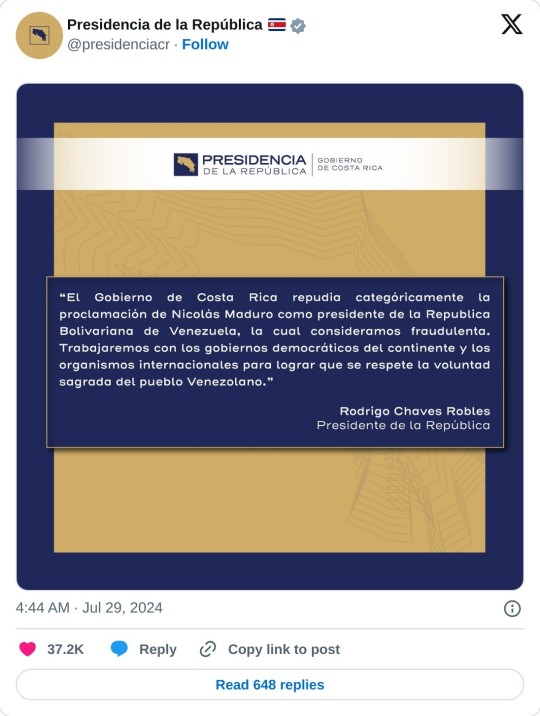
[Logo] Presidency of the Republic, Costa Rica Government.
The Government of Costa Rica categorically repudiates the proclamation of Nicolás Maduro as president of the Bolivarian Republic of Venezuela, which we consider fraudulent. We will work with the democratic governments of the continent and international organizations to ensure that the sacred will of the Venezuelan people is respected.
— Rodrigo Chaves Robles, President of the Republic of Costa Rica
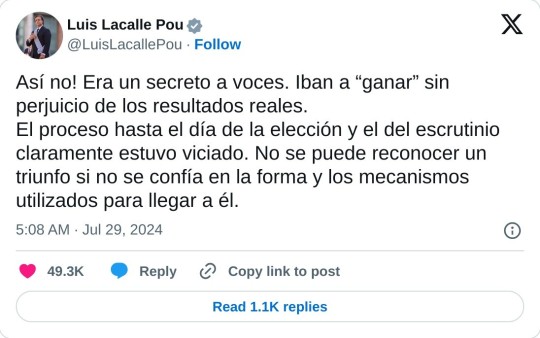
Not this way! It was an open secret. They were going to “win” regardless of the actual results. The process up to election day and counting was clearly flawed. You cannot recognize a triumph if you do not trust the form and mechanisms used to achieve it.
— Luis Lacalle Pou, President of the Oriental Republic of Uruguay
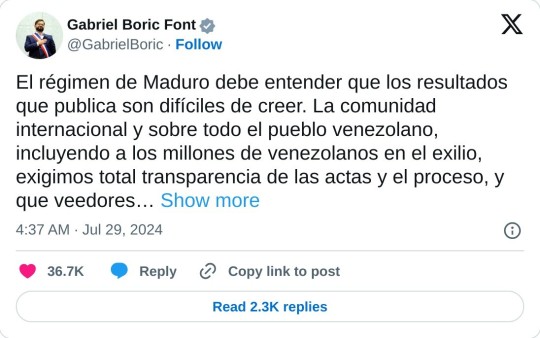
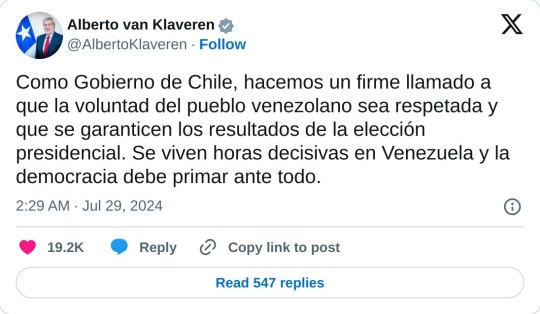
The Maduro regime must understand that the results it publishes are difficult to believe. The international community, and especially the Venezuelan people, including the millions of Venezuelans in exile, demand total transparency of the records and the process, and for international observers not committed to the government to attest to the veracity of the results.
From Chile we will not recognize any result that is not verifiable.
— Gabriel Boric Font, President of the Republic of Chile
As the Government of Chile, we make a firm call for the will of the Venezuelan people to be respected and for the results of the presidential election to be guaranteed. These are decisive hours in Venezuela and democracy must prevail above all.
— Alberto van Klaveren, Minister of Foreign Affairs of Chile
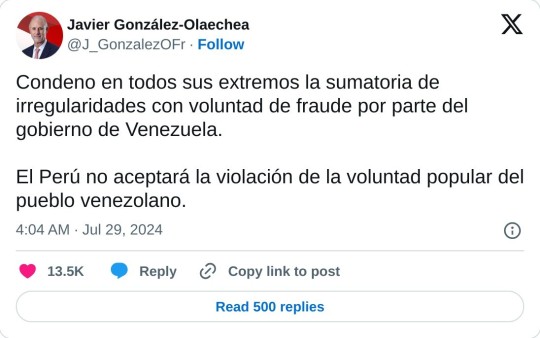
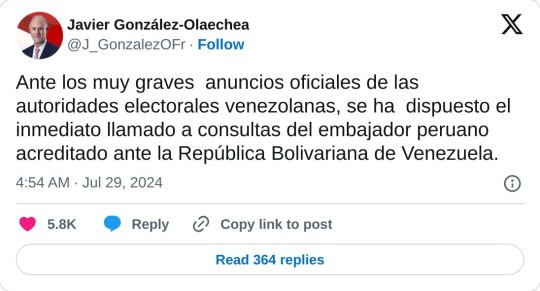

I condemn in all its extremes the sum of irregularities with the intention of fraud on the part of the government of Venezuela.
Peru will not accept the violation of the popular will of the Venezuelan people.
Given the very serious official announcements of the Venezuelan electoral authorities, the immediate call for consultations of the Peruvian ambassador accredited to the Bolivarian Republic of Venezuela has been arranged.
Several countries in the region are coordinating joint actions so that the will of the Venezuelan people expressed yesterday is undoubtedly respected. There is no going back, take as long as it takes. Our ambassador in Venezuela, called in for consultations, leaves Caracas today.
— Javier González-Olaechea, Chancellor of Peru
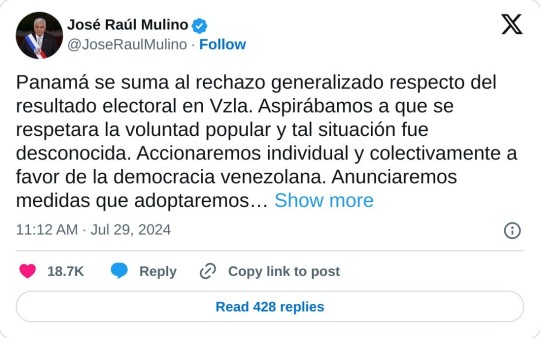
Panama joins to the generalized rejection regarding the electoral result in Vzla. We aspired for the popular will to be respected and such a situation was not expected. We will act individually and collectively in favor of Venezuelan democracy. We will announce measures that we will adopt in accordance with inter-American rules in the coming hours.
— José Raúl Mulino, President of the Republic of Panama

DICTATOR MADURO, OUT!!!
Venezuelans chose to end the communist dictatorship of Nicolás Maduro. The data announce a crushing victory for the opposition and the world is waiting for him to recognize defeat after years of socialism, misery, decadence and death.
Argentina is not going to recognize another fraud, and hopes that the Armed Forces this time will defend democracy and the popular will.
Freedom Advances in Latin America.
— Javier Milei, President of the Argentine Republic
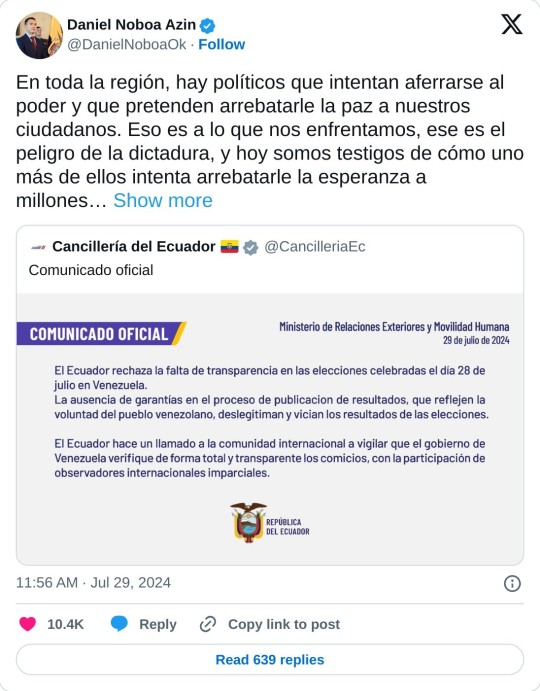
Throughout the region, there are politicians who try to cling to power and seek to rob our citizens of peace. That is what we are facing; that is the danger of dictatorship, and today we are witnessing how one more of them tries to take hope away from millions of Venezuelans.
Ecuador had the opportunity to prevent the interests of a few from prevailing over the will of millions. Venezuela deserves that opportunity; therefore, I have requested our foreign minister to take the necessary steps to convene the Permanent Council of the OAS to address the delicate situation in Venezuela.
— Daniel Noboa Azin, President of the Republic of Ecuador
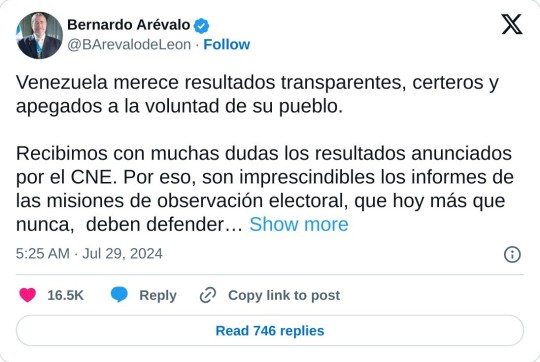
Venezuela deserves transparent, accurate results that adhere to the will of its people.
We receive the results announced by the CNE with many doubts. For this reason, the reports of the electoral observation missions are essential, which today, more than ever, must defend the vote of Venezuelans.
— Bernardo Arévalo, President of the Republic of Guatemala
29 notes
·
View notes
Text
[Kyiv Independent is Private Ukrainian Media]
The European Union will urge its member states to shut off all EU funding to Budapest if Hungary does not back down on its pledge to veto the EU's proposed $55 billion military aid package for Ukraine, a leaked document prepared by EU officials and seen by the Financial Times revealed on Jan. 28.[...]
The leaked document, drawn up by officials in the European Council, criticizes the "unconstructive behaviour of the Hungarian PM," while establishing a framework for countries to permanently cut EU funding with the intention of "spooking the markets, precipitating a run on the country’s forint currency and a surge in the cost of its borrowing," according to the Financial Times.
The alleged document also notes that Brussels would aim to impact investor confidence in the country's ability to create jobs and drive growth.[...]
The EU has also considered using the "nuclear option" of revoking Hungary's voting rights if it again vetoes the $55 billion aid package for Ukraine at an upcoming European Council summit next week, Politico reported on Jan. 26.
The Hungarian far-right party Our Homeland declared its claim to Ukraine's Zakarpattia Oblast if Ukraine loses the war, party leader Laszlo Toroczkai said on Jan. 27.
Zakarpattia Oblast, bordering Slovakia and Hungary to the west, and Romania to the south, has a significant population of ethnic Hungarians. The issue of minority rights has created friction between Hungary and Ukraine, particularly centered around Ukrainian state linguistic policies.
The language law that has long been a source of strife between Hungary and Ukraine was instituted in 2017 and requires at least 70% of education above fifth grade to be conducted in Ukrainian.
In response to criticism, Ukraine has said that it does not intend to limit the linguistic rights of its minorities but rather to simply ensure that all Ukrainian citizens have the sufficient capability to speak the national language, Ukrainian.[...]
Hungary's Foreign Ministry did not respond to requests for comment on Toroczkai's statements, Reuters said.
The news came ahead of a meeting between Ukraine's Foreign Minister Dmytro Kuleba and his Hungarian counterpart Peter Szijjarto scheduled to take place on Jan. 29 in the Zakarpattia Oblast city of Uzhhorod.
In the leadup to Szijjarto's visit, the Hungarian newspaper Magyar Nemzet, considered to be closely affiliated with Hungarian Prime Minister Viktor Orban, published an article condemning the state of Ukraine's press freedom. It also criticized Ukrainian media directives for journalists to use the official Ukrainian spelling of city names instead of the Russian version.
28 Jan 24
[Ukrinform is Private Ukrainian Media]
The Hungarian side is asking Ukraine that a Hungarian minority be given back all the rights it had before 2015.
This was stated by Hungarian Minister for Foreign Affairs Peter Szijjarto at a joint briefing with his Ukrainian counterpart Dmytro Kuleba and Head of the Ukrainian President’s Office Andriy Yermak following the talks in Uzhhorod, according to an Ukrinform correspondent.
"We have come here to reestablish good neighborly relations, we have a long way to go, but we, from the Hungarian side, are ready to do this work. In Zakarpattia, Hungarians and Ukrainians live in peace," Szijjarto said.[...]
"Since 2017, laws have been passed to reduce the rights of the Hungarian minority. In December, Parliament passed a law that stopped that. But we have a request - maybe it's too much, and you will think I'm not being polite - but we ask that the Hungarian minority be given back all the rights it had before 2015. We are not asking for anything else," the minister said.
The Foreign Minister said that the Hungarian side had formulated an 11-point request: including restoring the status of the national school, the possibility of taking a high school diploma in Hungarian and using Hungarian in social life. According to him, the commission was tasked with agreeing on these issues as soon as possible and developing proposals for the ministries.
29 Jan 24
40 notes
·
View notes
Text
[ 📹 Scenes from the remnents and wreckage following an airstrike conducted by the Israeli occupation army on a UNRWA School housing displaced Palestinian families in Deir al-Balah, in the central Gaza Strip, killing three Palestinian civilians and wounding another 15 others. ]
🇮🇱⚔️🇵🇸 🚀🏘️💥🚑 🚨
DAY 245: ISRAELI OCCUPATION REJECTS AMERICAN SECURITY COUNCIL RESOLUTION, REJECTS PALESTINIAN AUTHORITY CONTROL OVER RAFAH CROSSING, AL-QASSAM REFUSES TO DISARM UNTIL OCCUPATION AGREES TO WITHDRAW FORCES FROM GAZA, "ISRAEL" BOMBS ANOTHER UNITED NATIONS SCHOOL, CONTINUES SLAUGHTER OF CIVILIANS IN GAZA
On 245th day of the Israeli occupation's ongoing special genocide operation in the Gaza Strip, the Israeli occupation forces (IOF) committed a total of 8 new massacres of Palestinian families, resulting in the deaths of no less than 77 Palestinian civilians, mostly women and children, while another 222 others were wounded over the previous 24-hours.
It should be noted that as a result of the constant Israeli bombardment of Gaza's healthcare system, infrastructure, residential and commercial buildings, local paramedic and civil defense crews are unable to recover countless hundreds, even thousands, of victims who remain trapped under the rubble, or who's bodies remain strewn across the streets of Gaza.
This leaves the official death toll vastly undercounted as Gaza's healthcare officials are unable to accurately tally those killed and maimed in this genocide, which must be kept in mind when considering the scale of the mass murder.
"Israel's" representative to the United Nations, Gilad Erdan, informed his American counterpart at the United Nations, Linda Thomas Greenfield, that the Zionist occupation rejects the American United Nations Security Council (UNSC) resolution proposed by the United States supporting a ceasefire and hostage exchange deal offered by the Israeli occupation just last week.
Officials with the Zionist entity say the rejection of the Security Council resolution stems from an updated version of the resolution which refers to the proposal as one that will bring about a "ceasefire", rather than previous versions which referred to a "cessation of hostilities."
The Israeli occupation also objects to the resolution's call for both sides to fully implement the hostage exchange proposal, while a previous version of the resolution only called on Hamas to implement the proposal.
Additionally, the Zionist entity also objects to the inclusion of three phases of the hostage exchange deal, and also opposes the inclusion of a clause that "rejects any attempt at demographic or territorial change in the Gaza Strip, including actions that reduce the territory of Gaza, such as through the permanent establishment officially or unofficially of so-called buffer zones."
The occupation has already finalized plans to create a security buffer zone inside the Gaza Strip, which Israeli authorities claim is only temporary. The plans have already been condemned by the United States and several other actors in the International community.
Another line objected to by "Israel" calls for “unwavering commitment to achieving the vision of a negotiated two-state solution… consistent with international law and relevant UN resolutions, and in this regard stresses the importance of unifying the Gaza Strip with the West Bank under the Palestinian Authority." When a two-stste solution has already been rejected by the Netanyahu regime.
Previously, on Friday last week, US President Joe Biden gave a speech outlining the Israeli proposal with the hope that doing so would force the Israeli Prime Minister to stand behind the deal as offered by Israeli negotiators while also calling on the Hamas resistance group to accept the deal.
Since then, the two Fascist extremists Ministers; Israeli Finance Minister, Bezalel Smotrich, and the occupation's National Security Minister, Itamar Ben-Gvir, have threatened to pull their support for the emergency war cabinet government if Prime Minister Netanyahu accepts the current proposal.
At the same time, on the Palestinian side of the negotiations, the leader of the Hamas resistance forces in the Gaza Strip, Yahya Sinwar, has clearly established his position that the Hamas resistance movement refuses to disarm or "sign an agreement requiring" unilateral disarmament until the Israeli occupation agrees to to the complete withdrawal of forces from the Gaza Strip.
In a recent article published by the US newspaper, the Wall Street Journal, Sinwar emphasized that the Hamas movement stands by its previous statements refusing to agree to any deal until the Israeli entity committed to a "permanent ceasefire," and the withdrawal of forces from Gaza.
In other news today, Friday, June 7th, the Israeli occupation has rejected the idea of turning over control of the Rafah border crossing to the Palestinian Authority.
According to a piece published in Axios, during discussions between the Israeli occupation officials and the Egyptian authorities, the Zionist entity said it refuses to "allow any role for the Palestinian Authority in operating" the Rafah Crossing.
The article states that during a meeting of the Israeli entity's security cabinet ahead of talks in Egypt, Zionist Prime Minister, Netanyahu, said he does not agree to any role for the Palestinian Authority at the Rafah Crossing.
An anonymous source with the Biden administration told Axios that Netanyahu's remarks "contradicted a policy approved in the war cabinet a few days earlier that said Israel would agree to the Rafah Crossing being operated by any government entity other than Hamas."
Israel claims it has no problem with Palestinians affiliated with Fatah, the governing party of the occupied West Bank and the political party of Palestinian President Mahmoud Abbas, operating the border crossing, but refused to agree to them operating the crossing as "official representatives of the Palestinian Authority," the officials said.
Instead the Israeli occupation suggested that pre-approved Palestinians operate the crossing as a "local civilian committee," which the Palestinian Authority and Egypt both rejected outright.
The Egyptian authorities, for their part, proposed a follow-up meeting to discuss the crossing issue with the Palestinian Authority's Director of Intelligence Maj. General Majed al-Faraj, but the Israeli authorities refused, responding by saying that the directive of the occupation's government is to not hold any discussions about Gaza with the Palestinian Authority.
Meanwhile, the Israeli occupation continues keeping the Rafah and Karm Abu Salem border crossings closed for the time being, which has been so since early May when an Israeli military operation took control over the two crossings, closing the border to humanitarian aid convoys, along with blocking access for sick and wounded Palestinians seeking medical treatment abroad.
At the same time, the Israeli occupation continues its genocide operation in the Gaza Strip, bombing and shelling civilian housing and infrastructure, and slaughtering civilians by the dozens.
According to local Palestinian reporting, at least 54 bodies of murdered Palestinians have arrived at Al-Aqsa Martyrs Hospital in Deir al-Balah, in the central Gaza Strip, over the previous 24-hours.
Speaking with the local media, hospital spokesperson, Khalil Al-Dakran stated that "54 martyrs and dozens of injuries arrived at the hospital as a result of the continued Israeli aggression on the Central Governorate during the past 24 hours."
"The continued violent Israeli aggression on the Central Governorate affects the hospital's ability to accommodate new cases in light of the difficult conditions it is experiencing due to the lack of fuel, equipment, and medical supplies," the spokesperson continued, adding that a work stoppage at the hospital would be a disaster for central Gaza.
After several weeks of fighting in the north and south of Gaza, the occupation's bombing campaign has driven hundreds of thousands of Palestinians into the Central Gaza Governate, while the Israeli occupation forces (IOF) intensified their attacks on areas of central Gaza. At the same time, Israeli ground operations penetrated neighborhoods east of the Bureij and Al-Maghazi Camps.
In the meantime, in the latest horrific war crime, Zionist warplanes, on Friday, bombed a school belonging to the United Nations Relief and Works Agency for Palestinian refugees (UNRWA) in the Al-Shati Refugee Camp, west of Gaza City, killing at least three Palestinians and wounding more than 15 others.
This comes just one day after a massacre when the occupation army bombed a United Nations school in the Camp 2 area of the Nuseirat Camp, in the central Gaza Strip, killing 45 civilians and wounding more than 75 others.
According to local reporting, the latest strike was responsible for killing three civilians and wounding 15 others after occupation aircraft bombed a room inside the UNRWA Asma "C" School in the Al-Shati Camp, west of Gaza City, after which, the dead and wounded were transported to Al-Ahli Baptist Hospital in the city.
The three Palestinians killed in the strike were Saadallah Abu Al-Amrain, Akram Aqilan, and Khaled Shehadeh.
Elsewhere in Gaza, occupation fighter jets launched an air raid on the Al-Jaafrawi neighborhood, east of Deir al-Balah, in the central Gaza Strip, killing two civilians and wounding several others who were taken to Al-Aqsa Martyrs Hospital in the city.
In another atrocity, Zionist air forces bombed a civilian vehicle passing through the Nuseirat Camp, resulting in the deaths of two civilians and wounding a number of others, while another airstrike targeting the Abu Holi area, south of Deir al-Balah, killed two more civilians and wounded several others.
Yet another Palestinian was killed, and even more wounded, after occupation forces opened gunfire, while armored vehicles fired artillery shells, on areas west of Rafah, in the southern Gaza Strip.
Local medical sources confirmed receiving the corpses of 6 civilians after Zionist warplanes bombed a residential home belonging to the Al-Rafati family, north of the Al-Maghazi Camp, in the central Gaza Strip, while another occupation airstrike on residential areas of the Al-Soura neighborhood of Gaza City, killed at least two citizens.
Meanwhile, the occupation army continued its destruction in bombing the town of Al-Zawaida, in central Gaza, resulting in a number of dead and wounded who were transferred to Al-Aqsa Martyrs Hospital.
The Israeli occupation's war crimes continued when Israeli fighter jets bombed a residential house belonging to the Al-Maghari family in the Al-Maghazi Camp, in central Gaza, at dawn today, resulting in the assassination of Bassam Al-Maghari, his wife, his son, his daughter and her two children.
Speaking with local media, Nabhan Al-Maghari, the sole survivor of the Zionist assault, said that his family had been displaced from their home in Rafah last month, finding refuge in the home of their relatives from the Al-Rafati family, which was then bombed by the occupation forces just after breaking their fast, killing all his family members.
Similarly, occupation warplanes bombed in the vicinity of the Saffron Mosque, as well as near the youth stadium in the Maghazi Camp, while also bombing civilian residences east of the Bureij Camp, east of Deir al-Balah, and north of the Nuseirat Camp, resulting in a conflagration near the Abu al-Rus Roundabout in the Bureij Camp.
Additionally, the Israeli occupation also bombed a residential house belonging to the Issa family near the Bisan Medical Center in the Bureij Camp, resulting in a number of casualties.
Zionist armored vehicles also opened fire with intense artillery bombardments east of the Bureij Camp, while also launching violent raids on neighborhoods in the Nuseirat Camp.
The Israeli horrors went on with another occupation airstrike on a civilian home belonging to the Ashram family in the vicinity of the Al-Salam Mosque, in the Al-Sabra neighborhood, south of Gaza City, killed two civilians and wounded several others who were transported to Al-Ahli Arab Hospital in the city.
The Israeli occupation also hammered several other neighborhoods of Gaza City, including the Tal al-Hawa, Sheikh Ajlin, Al-Sabra and Al-Zaytoun neighborhoods, coinciding with intense gunfire and artillery shelling from the occupation's armored vehicles stationed south of Gaza City.
Zionist gunboats also fired several shells towards civilian homes near the Fisherman's Port area, in addition to the Shiekh Ajlin neighborhood, west of Gaza City.
At the same time, Israeli artillery shelling pummelled parts of the town of Al-Qarara, north of Khan Yunis, while occupation fighter jets launched several raids on the Oreiba area north of Rafah, in the southern Gaza Strip, and also on the Tal al-Sultan neighborhood, west of Rafah.
Another five civilians were assassinated in an airstrike on a building belonging to the Nuseirat Municipality in central Gaza, killing five Palestinians, including the Mayor of Nuseirat, Lyad Al-Magharibi.
Further, an airstrike on Thursday night conducted by the Israeli occupation forces on a residential home belonging to the Abu Shaaban family in the Al-Sabra neighborhood, south of Gaza City, killed one civilian and wounded several others who were taken to the Al-Ahli Baptist Hospital in the city.
As a result of the Israeli occupation's ongoing special genocide operation in the Gaza Strip, the infinitely rising death toll now exceeds 36'731 Palestinians killed, including over 15'000 children and upwards of 10'000 women, while another 83'530 others have been wounded since the start of the current round of Zionist aggression, beginning with the events of October 7th, 2023.
June 7th, 2024
#source1
#source2
#source3
#source4
#source5
#source6
#source7
#source8
#source9
#source10
#source11
#videosource
@WorkerSolidarityNews
#gaza#gaza strip#gaza news#gaza war#gaza genocide#genocide in gaza#israeli genocide#genocide#war crimes#crimes against humanity#israeli war crimes#war in gaza#palestine#palestine news#palestinians#free palestine#gaza conflict#israeli occupation#occupation#middle east#israel palestine conflict#war#news#geopolitics#world news#global news#international news#breaking news#israel#current events
26 notes
·
View notes
Text
Ataoğlu attends the meeting of TURKSOY
TRNC Deputy Prime Minister, Minister of Tourism, Culture Youth and Environment Fikri Ataoğlu attended the 40th Term Meeting of the Permanent Council of Ministers of Culture of the Member States of the International Organisation of Turkic Culture (TURKSOY) held on October 13th-14th 2023 in Shusha, the ancient city of Azerbaijan and Cultural Capital of the Turkic World 2023.
Continue reading…
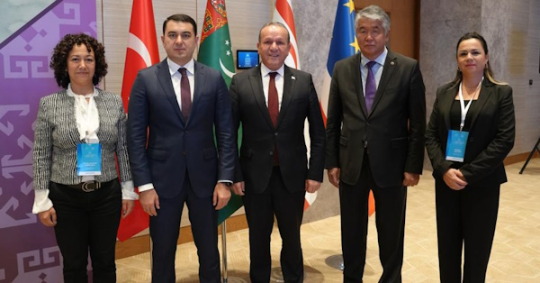
View On WordPress
#40th Term Meeting#AZERBAIJAN#Fikri Ataoglu#International Organisation of Turkic Culture (TURKSOY)#Permanent Council of Ministers#TRNC Deputy Prime Minister#Turkic world
0 notes
Text
ok so the slovenian government announced today it will participate in the ICJ proceedings against israeli occupation of gaza and the west bank, which is based on a december 2022 UN resolution and is thus separate from the SA genocide case {wiki page}
there have been calls for slovenia to intervene in the genocide case too, to which the minister of foreign affairs has said that "Slovenia supports the proceedings regarding the violations of the Genocide Convention both in the case of Ukraine and Palestine ...", but that it is not yet possible to intervene as the court has to first decide whether it has jurisdiction over the case or not (her statement of support is also not an official position of the country afaict) {x}. she said that the decision will be made at the governnent level {x} (i.e. she evaded the question, but the fact the she hasn't dismissed it is positive, and both the pm and the president as a rule follow her lead, not the other way around; not to mention that the left party, a coalition member, has been very vocal about how slovenia is not doing enough, how we should recognize the state of palestine, apply the bds measures etc., so that's a force pushing in that direction as well). the ambassador to the UN security council said that slovenia regards the case "with great interest" {x}
considering the fairly consistent discourse of slovenian foreign policy on the israel-palestine conflict and especially the expressed need for principled and consistent political positioning during the slovenian mandate in the UN security council, i am moderatly optimistic that it might actually intervene in the case
fajon can be quite frustrating, because you really have to comb through what she's saying to find anything of substance, but i have been surprised at times by her discourse in the past few months, for example when she said that if not the EU as a whole, then a smaller group of like-minded countries within the EU could jointly recognize the state of palestine "when the time is right" (– slovenian politicians have been waiting for the right time to recognize palestine for literally a decade, but in this context specifically fajon has said that the condition for that to happen is permanent ceasefire) {x}, or when she explitictly designated the attacks on schools and hospitals and critical infrastructure as severe violations of international humanitarian law – apparently she appeared on CNN a few days ago where she said that Israel was "definitely" in the breach of international humanitarian law {fb link to the video} {x}, which reportedly made israel angry, but she'd already said the same thing in the UN security council chambers a month ago {x}, so that wasn't new for them and she'd been saying that since november at least {x}. i was also really positively surprised when in the context of the exchange of hostages she designated the palestinian prisoners as political prisoners {x} (only in a podcast, but still)
ofc this is still far from ideal, much more decisive measures would be needed (cf. what the left party wants above) and they'd be more effective too, imho, but this is honestly more than i expected from a politician who, idk – i suspect! – wants to present our country as a potential mediator in the conflict and thus doesn't want to step on israel's toes too much, or at least wants to keep the image of a "reliable partner" with regards to the us, still, while going as far as possible in (what she thinks might be) toeing the line
#incidentally the suggestion of a smaller group of countries recognizing palestine was smth i included in my letter to the minister just a#month before‚ so obv that must be my influence lol#also im sorry for including a fb link but i couldn't find the whole interview elsewhere#she talked both about ukraine and gaza but the only clips i could find elsewhere where only with the part on ukraine#anyway#i am optimistic but we'll see#j#p#slovenia#slovenian politics
35 notes
·
View notes
Text
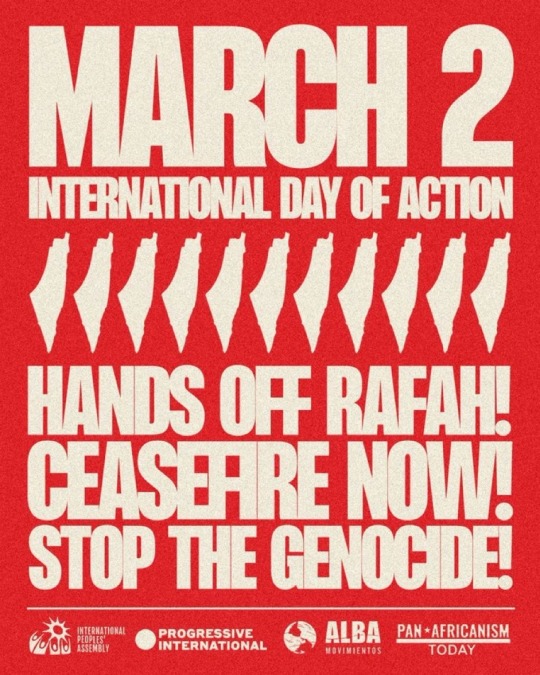
Honestly did not know there was a requested day of action/media black out for the 2nd of March.
To help I have collected some resources in this post. This one is going to be Australia focused but applicable to other countries (at least some actions)
Join me and my work colleagues to pressure Australian Universities to cut ties with Israel and demand a permanent ceasefire. Sign the petition here we need 1000 signatures and its open to everyone
Keep up to date with Australian Palestine Advocacy Network. APAN lists events coming up for each state
If you are in South Australia follow Australian Friends of Palestine Association on instagram for latest boycotts and protests
Sign the petition to reinstate funding to UNRWA (takes less than 2 minutes) Australian only
Make sure you boycott companies on the BDS website. They have Australia relevant boycotts too
Email and Call up Senator Penny Wongs and the Prime Ministers office! Write down key points: Your name, where you’re from, how you are concerned and upset about the genocide in Palestine, demand that Australia do more to prevent further death, over 80% of Australians want a ceasefire. Currently we demanding that Australia reinstate UNRWA funding and we stop supplying arms to Israel. If calling stresses you out do it out of office hours and leave a message.
Contact local MPs and councils and demand they pass a ceasefire motion.
Donate eSIMs (extremely easy to do! Ive hit link limit google gazaesims) and donate to humanitarian organisations (image below)

16 notes
·
View notes
Text
España, Irlanda y Noruega reconocerán a Palestina como Estado - Spain, Ireland, and Norway will recognize Palestine as a State
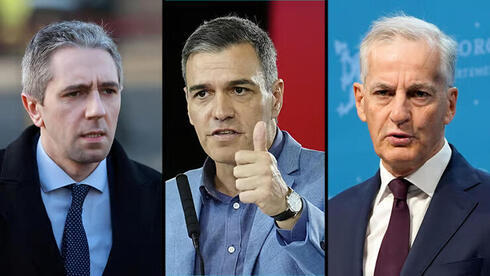
El presidente del gobierno español, Pedro Sánchez, anunció el miércoles 22 de mayo que el Consejo de Ministros aprobará el reconocimiento de Palestina como Estado el próximo 28 de mayo. Sánchez reveló la fecha durante su comparecencia ante el pleno del Congreso, donde informó sobre sus contactos con otros líderes para recabar apoyo al reconocimiento de Palestina.
En una acción conjunta, el primer ministro irlandés, Simon Harris, también anunció este miércoles que reconocerá a Palestina como Estado el próximo 28 de mayo. Harris destacó la importancia de este paso en la búsqueda de una "paz permanente" entre israelíes y palestinos, calificando el evento como "un día histórico e importante para Irlanda y Palestina".
Además, el primer ministro noruego, Jonas Gahr Støre, confirmó que Noruega se sumará a esta iniciativa, reconociendo la existencia del Estado palestino a partir del 28 de mayo. Støre enfatizó el compromiso de Noruega con la promoción de la paz en la región y destacó la importancia de este movimiento coordinado con España e Irlanda.
Este anuncio conjunto de España, Irlanda y Noruega subraya su compromiso compartido hacia una solución pacífica y duradera al conflicto israelí-palestino, y podría tener implicaciones significativas en el ámbito internacional.

The President of the Spanish Government, Pedro Sánchez, announced on Wednesday, May 22nd, that the Council of Ministers will approve the recognition of Palestine as a State on May 28th. Sánchez revealed the date during his appearance before the full Congress, where he reported on his contacts with other leaders to gather support for the recognition of Palestine.
In a joint action, the Irish Prime Minister, Simon Harris, also announced this Wednesday that Ireland will recognize Palestine as a State on May 28th. Harris highlighted the importance of this step in the pursuit of a 'permanent peace' between Israelis and Palestinians, describing the event as 'a historic and important day for Ireland and Palestine.'
Furthermore, the Norwegian Prime Minister, Jonas Gahr Støre, confirmed that Norway will join this initiative, recognizing the existence of the Palestinian State starting on May 28th. Støre emphasized Norway's commitment to promoting peace in the region and highlighted the importance of this coordinated movement with Spain and Ireland.
This joint announcement by Spain, Ireland, and Norway underscores their shared commitment to a peaceful and lasting solution to the Israeli-Palestinian conflict, and could have significant implications internationally
#chile#argentina#españa#gaza#latinoamérica#middle east#news#noticias#palestina#palestine#free palestine#free gaza#gaza genocide#usa#usa news#united states#uk news#uk#ireland#norway#europe
15 notes
·
View notes
Text
By: Zachary Berman
Published: Apr 4, 2024
Latest Developments
Hamas rejected the latest Gaza ceasefire proposal on April 4, refusing to compromise on its maximalist position. “We are committed to our demands,” Hamas chief Ismail Haniyeh said. Those demands include a permanent ceasefire, Israel’s complete withdrawal from the Gaza Strip, the return of Palestinians displaced from northern Gaza, and an “honorable prisoner exchange deal,” Haniyeh said. Jerusalem has repeatedly made clear that any deal that leaves Hamas intact is unacceptable.
Israeli Prime Minister Benjamin Netanyahu greenlighted the latest round of Egyptian- and Qatari-mediated talks on March 29, giving the Israeli team what his office described as “room to operate” in negotiations. Jerusalem accepted the latest proposal, which would have seen Israel temporarily pause its counteroffensive in Gaza and Hamas free the remaining hostages.
Expert Analysis
“Hamas has said that it is unwilling to back down from its outrageous demands. Since Yahya Sinwar and Mohammad Deif understand their days are numbered, their incentive to make a deal is limited or possibly nonexistent. They seem to be mercilessly dragging the hostage families through this process over and over again just to remain in the headlines.” — Enia Krivine, Senior Director of FDD’s Israel Program and National Security Network
“Israel wants to negotiate a hostage release before finishing off Hamas. Hamas wants to survive. The more Hamas leaders believe they will survive without giving up their leverage — hostages — the more they will hold out. The more they believe they have no other choice, the more seriously they will negotiate.” — Richard Goldberg, FDD Senior Advisor
Hamas Turns Down Four Ceasefire Offers
Hamas rejected previous ceasefire proposals in December and January. In February, the White House expressed hope that Hamas had scaled back its demands, but the terrorist group continued to dig in its heels. In late March, Israel agreed to pause its counteroffensive in Gaza for six weeks and release approximately 700 Palestinian prisoners in exchange for 40 Israeli hostages. Hamas rejected that offer on March 26. Israeli officials claimed that Hamas had sabotaged negotiations by trying to turn the proposed ceasefire into the restoration of the status quo ante.
Israeli officials attributed Hamas’s position to efforts by the group’s Gaza leader, Yahya Sinwar, to keep tensions high during Ramadan, with a view to provoking escalation. They also suggested that Hamas’s position hardened after the United States abstained from a UN Security Council vote on March 25, tacitly allowing the council to pass a resolution that called for a ceasefire without explicitly conditioning it on a hostage release.
130 Hostages Remain in Gaza
Hamas released 81 Israeli hostages during a week-long pause in November in exchange for 240 Palestinian prisoners. Additionally, Hamas released 23 Thai nationals, one Filipino, and three Israeli-Russian dual citizens under separate arrangements with Bangkok, Manila, and Moscow. The pause collapsed on December 1, when Hamas refused to provide a list of the remaining women and children in captivity and resumed launching rockets at Israel. On February 12, Israeli special forces rescued two hostages — Fernando Marman, 61, and Louis Har, 70 — from Rafah in southern Gaza. Approximately 130 hostages remain in Gaza, 34 of whom Israel believes are no longer alive.
==
Reminder, and particularly for the "ceasefire now" apologists, that Hamas don't want a "ceasefire," they want dead Jews. They broke the last ceasefire, and October 7 terrorist attack was itself a violation of the ceasefire in place at the time.

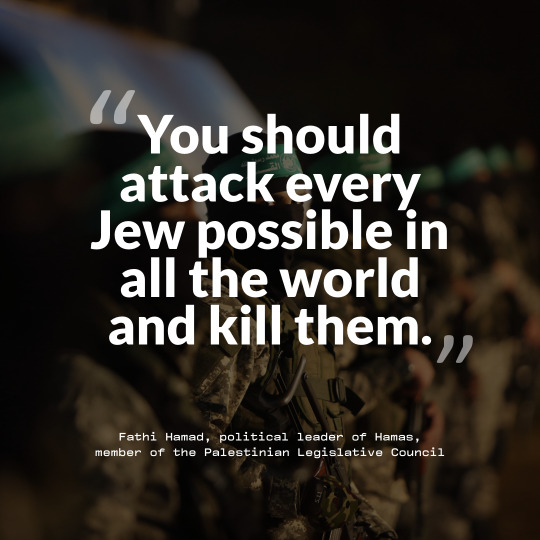

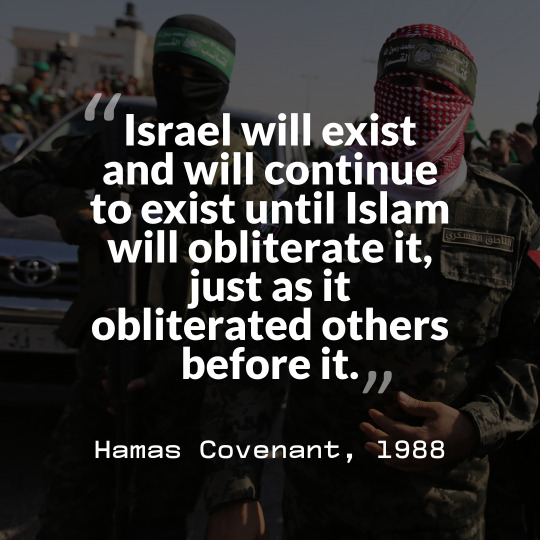
The only way this ends is for Hamas to be completely exterminated.
#release the hostages#israeli hostages#ceasefire#ceasefire now#israel#hamas#am yisrael chai#pro hamas#hamas supporters#palestine#pro palestine#islamic terrorism#islam#hamas terrorism#exterminate hamas#religion is a mental illness
15 notes
·
View notes